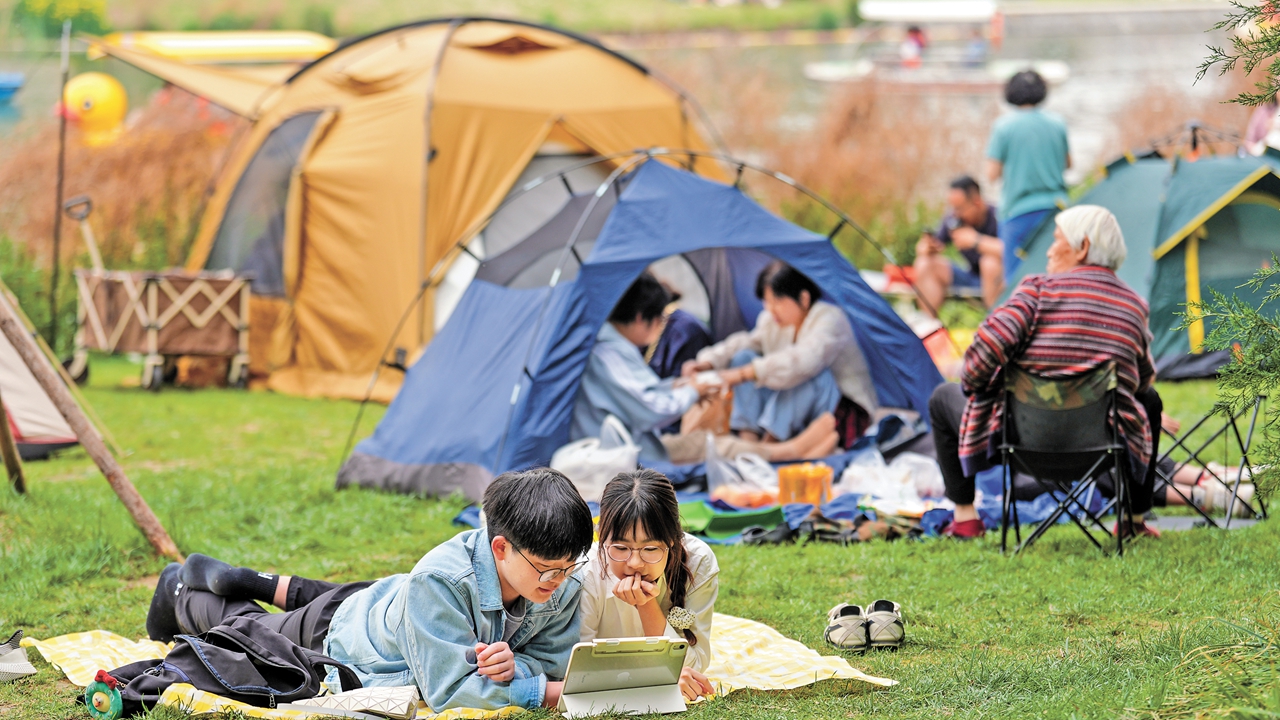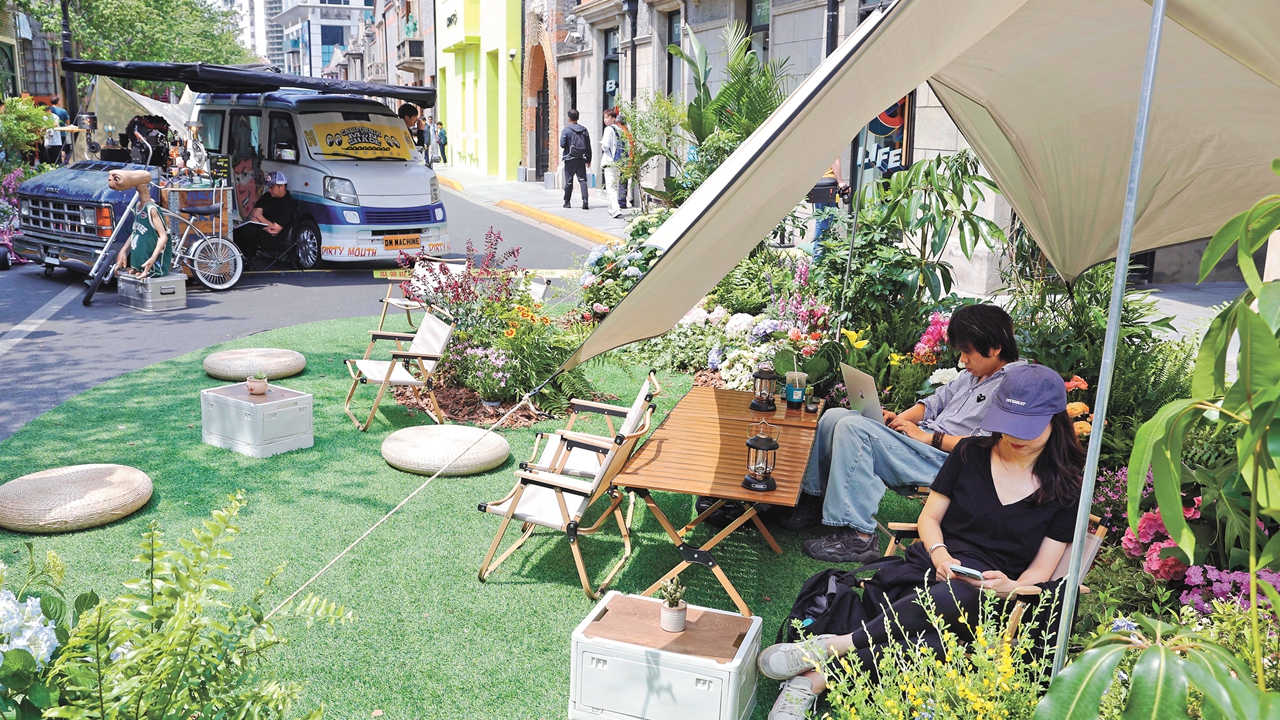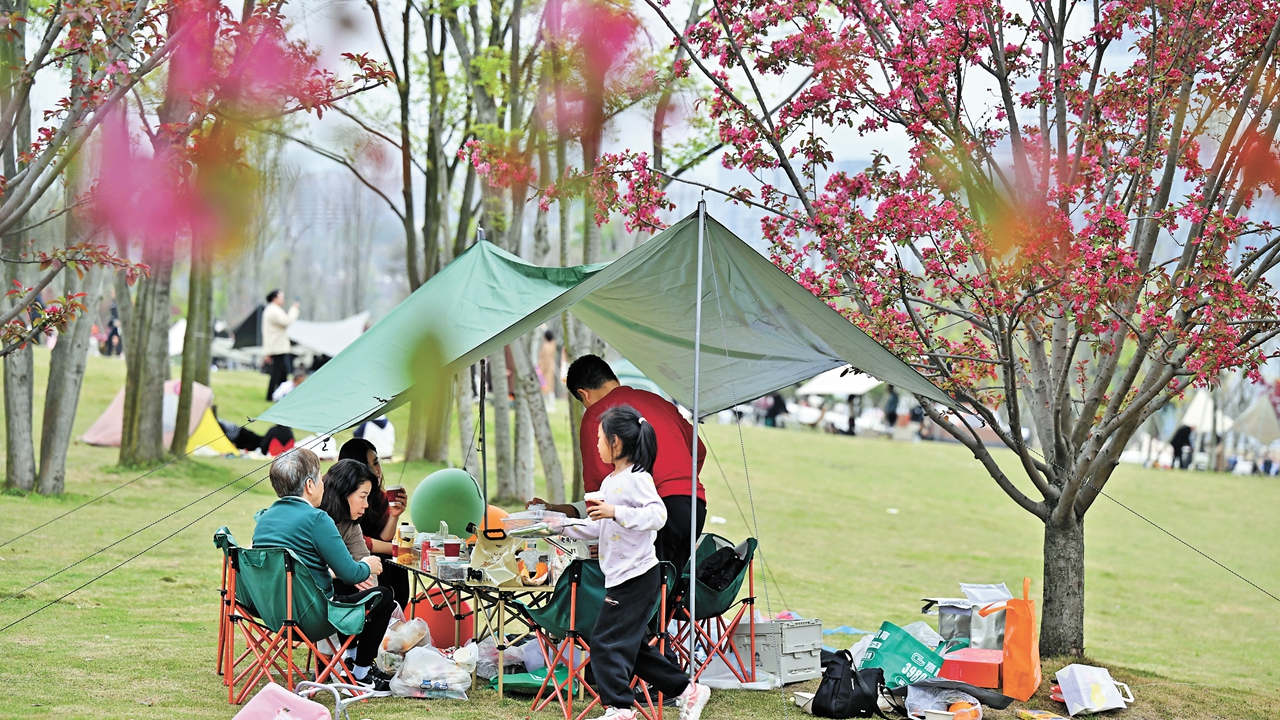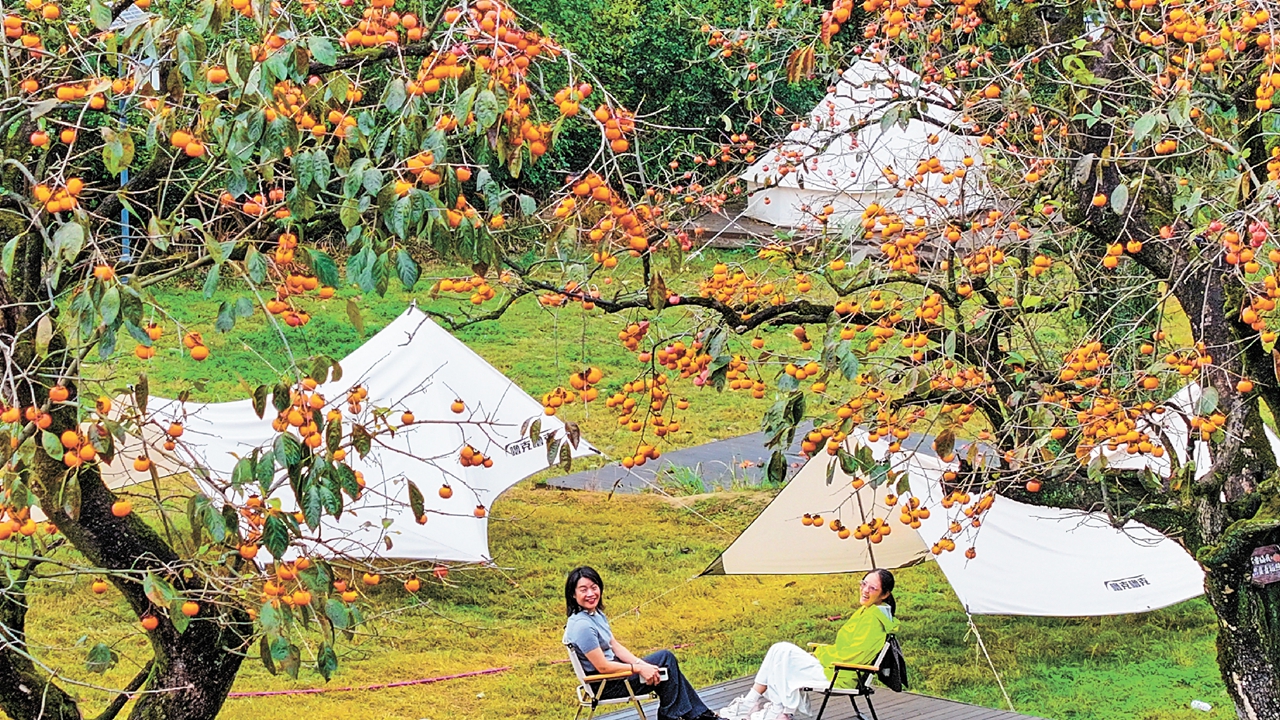From niche to mainstream: Day camping craze fuels boom in outdoor economy
Writer: | Editor: Lin Qiuying | From: | Updated: 2025-06-12
On a crisp weekend morning, Pan Rongfeng, a middle school teacher in his 30s, pulled up to a verdant campsite at the foot of Daming Mountain, southern China’s Guangxi Zhuang Autonomous Region, before unloading his dog and a panoply of camping gear from his car.
It was a cherished holiday ritual for Pan as he took to the great outdoors to savor his time off.
“Over the past two years, more and more people around me have started to turn to campsites for a little escape from urban life,” said Pan. “As long as the weather is agreeable, I love to gather outdoors to unwind.”
Once a niche hobby, day camping has broken into the mainstream across China in recent years, transforming the way people pursue leisure.
Data from Meituan, a leading life services provider, highlighted the trend. During this year’s Tomb-Sweeping Day, a traditional Chinese holiday where people are entitled to a block of days off, searches for “campgrounds” in Guangxi skyrocketed 50% over the same period last year.
The allure of such outdoor activity has not gone unnoticed on Chinese social media, with many day camping-related posts amassing millions of views.
 People camp in Chaoyang Park in Beijing in this May 4, 2025 photo. Photos from Xinhua
People camp in Chaoyang Park in Beijing in this May 4, 2025 photo. Photos from Xinhua
On RedNote, a Chinese lifestyle app and the country’s version of Instagram, the popularity of notes titled “day camping tips” and “campsite recommendations” continued to rise before and during the five-day May Day holiday, while short-video platforms like Douyin have logged billions of plays for relevant content.
At a riverside park in Nanning, weekend campers packed the vast grassy field, with latecomers like Huang Xiaqing, a Nanning local, struggling to find a big enough space to settle her family and friends.
“If you arrive here half past nine on a weekend morning, it can be a huge hassle to find a spot to put up your tent,” said Huang. “That has almost always been the case since we began this holiday ritual one year ago.”

People camp in Lianhua Hill Park in Shenzhen in this file photo.
Wei Wanqing, a sociology professor with East China Normal University in Shanghai, believes that the growing appeal of day camping has extended far beyond the scope of social media influencers doing location check-ins and boosting their online traction by sharing outdoor lifestyle photos.
“Families are increasingly embracing it as a way to bond and create shared memories,” said Wei.

Tourists enjoy leisure in a camp on a street in Shanghai in this May 3, 2025 photo.
In recent years, day camping, driven by the dual appeal of reconnecting with nature and fostering greater social connection, has gradually become a prominent element in China’s cultural and tourism landscape while giving rise to a burgeoning industry in the country.
Data from online database query platform Tianyancha.com show that there were over 223,400 camping-related companies in China by early April this year. Of these companies, 7,302 were registered in the first two months of this year, a 5.86% increase compared to the same period in 2024.

People camp out by the Xinglong Lake in Chengdu, Sichuan Province, to enjoy the springtime in this April 4, 2025 photo.
According to iiMedia Research, the growing appetite for day camping generated about 213.97 billion yuan (US$29.69 billion) in 2024, with a projection of 248.32 billion yuan in 2025, which will create a total market size of 1.44 trillion yuan.
The rising consumption of day camping-related products, ranging from essentials like tents and barbecue grills to derived demands like canopies, camping trolleys, and night lamps, has also helped catalyze the growth of related businesses.
At a store specializing in outdoor gear in Nanning, Lyu Hongping, the shop owner, saw a 30% annual revenue spike over the past three years, fueled by various demands for camping and hiking equipment.
“Camping has gone from a niche pastime for some to something that has attracted an increasing number of people from all walks of life,” said Lyu.

Tourists camp under persimmon trees in Dongping Village in Quzhou City, Zhejiang Province, to enjoy the autumn scenery in this Nov. 2, 2024 photo.
The influx of campers has a ripple effect, bringing in revenue for the local economy through increased patronage of nearby restaurants, rental shops, and tourist attractions, noted Hong Tao with the China Consumer Economics Society.
“Some of the campsites serve as a one-stop shop that offers everything from essential outdoor gear to personalized travel arrangements,” said Hong.
On Chinese e-commerce giant Taobao, a simple keyword search for “camping” would yield many relevant results, with many of the top sellers like waterproof mats, folding tables, and hammocks flying off the virtual shelves, some logging over 100,000 units sold in total and more than 1,000 daily purchases.
A recent consultancy report suggested that there has been a trend toward adding more eye-popping and tech-laden equipment and products, such as foldable outdoor projection screens and in-vehicle fridges, among modern-day campers.
Research highlights that the traditional style of “roughing it” with canvass tents and sleeping bags has given way to “glamping,” a new form of camping that involves more amenities and comforts, as day camping has transformed from a budget-friendly alternative to traditional travel to a highly customized activity that caters to different outdoor pursuits.
Xu Luyuan, a professor at Guangxi University of Finance and Economics, saw the rise of experience-based activities like day camping as an indication of an exciting shift away from “Daka” tourism, where tourists rush through cities and tick off as many attractions as possible within a limited timeframe, in favor of a form that focuses more on immersive experiences.
“It meets the growing demand among Chinese consumers for more personalized, experiential leisure pursuits, helps drive up domestic consumption, and charges up the integration of culture into tourism,” said Xu.
However, the surge in campers has put nature’s accommodating capacity to the test. Striking a balance between economic gains and environmental sustainability is a key challenge for the emerging sector to scale.
In response to the concern regarding the environmental impact of the rapid expansion of the camping economy, local authorities across the country have taken proactive steps by introducing guidelines to promote responsible camping practices that prioritize environmental protection and safety.
“Camping isn’t just a fad,” said Hong, who is convinced that with a focus on establishing a model that emphasizes differentiated services and supply-chain coordination, along with clear policy guidance, the sector can evolve beyond transient craze and become a lasting growth area for the country’s economy.
(Xinhua)